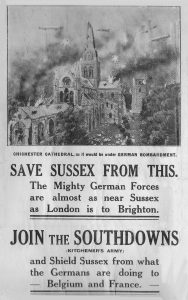
Gateways to the First World War and The Centre for Hidden Histories are working in collaboration with the Heritage Lottery Fund South East team to host a free and open First World War information event on 26th May 2017 at Hastings Museum from 10.00am – 4.00pm.
If you interested in doing something to commemorate the centenary of the First World War in the South East of England or if you want to find out more about unfamiliar parts of the war, and how you can get help from researchers to investigate aspects of the conflict, then this event is for you.
If you have thought of applying to the Heritage Lottery Fund’s First World War: Then and Now grant programme and need help shaping a project, or if you are coming to the end of a funded project and are looking for inspiration for another, then you will find lots to interest you here.
The session will involve presentations from:
- Professor Mark Connelly (University of Kent) on The Battlefields Revisited Project.
- Dr Chris Kempshall (East Sussex County Council and Goldsmiths, University of London) on The impact of the First World War on the South East.
- Susanne Crosby (Sound Architect Creative Media) on two HLF funded projects ‘The Day Sussex Died and Twelve and Sixpence’.
- Catherine Harvey (Hastings Museum) on the Hastings Remembers project.
- Sarah Wicks (HLF South East) on The First World War: Then and Now Grant.
- Mike Noble (Hidden Histories) on the Hidden Heroes of Empire project
- Liz Robertson (First World War centenary partnership)
There will also be an opportunity to discuss project ideas with engagement centre colleagues, HLF development staff and other community partners in the afternoon.
Booking is essential and can be done here. We might be able to offer help with travel expenses for community groups to attend this event. You can make a request for this when booking.
Gateways and Hidden Histories are two of five First World War Engagement Centre centres based in universities across the UK. They welcome enquiries from individuals or groups wherever they are located and are especially keen to reach out across the South East for this event. They can connect you with university researchers, recommend archives and resources, advise on documenting and sharing your project and direct you to relevant training. Each centre has areas of particular expertise. You can find out more on the First World War Engagement Centres website.
